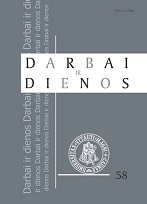Lietuvių kalbos denominatyviniai veiksmažodžiai ir greta jų vartojami pamatiniai žodžiai (tekstynotyrimas)
Co-occurrence of Denominal and Deadjectival Verbs with Their base Words in Modern Lithuanian (aCorpus-based study)
Author(s): Erika Rimkutė, Jurigis Pakerys, Andrius UtkaSubject(s): Cultural Essay, Political Essay, Societal Essay
Published by: Vytauto Didžiojo Universitetas
Keywords: Daiktavardis; būdvardis; veiksmažodis
Summary/Abstract: This paper aims to study cases when denominal and deadjectival (further referred to as denominal) verbs co-occur with their base words, cf. atstov-au-ti ‘to represent’ ← atstov-as ‘representative’ both (1) where the base word precedes the derivative and (2) where the base word is used after the derivative: (1) [PIRMININKAS]. Ačiū. Komiteto atstovas ponas K. Dirgėla, kuris komiteto pavedimu atstovauja šiam dokumentui [...] ‘[Chair-man] Thank you. The representative of the committee Mr. K. Dirgėla who represents this document’. (2) Bet vis dėlto mes, patinka kam ar nepatinka, atstovaujam tautai, esam tautos atstovai ir formuojam tam tikrą politiką [...] ‘But nevertheless, whether someone likes it or not, we represent the nation, we are the representatives of the nation and we form certain policies’. In these excerpts, the speaker uses the same stem both as a noun and as a verb (with the corresponding derivational suffix) and, as Lipka (1987: 64) argues, the use of the constituents of complex lexemes in the preceding or the following co-text creates lexical cohesion and coherence.
Journal: Darbai ir dienos
- Issue Year: 2012
- Issue No: 58
- Page Range: 81-91
- Page Count: 12
- Language: Lithuanian

